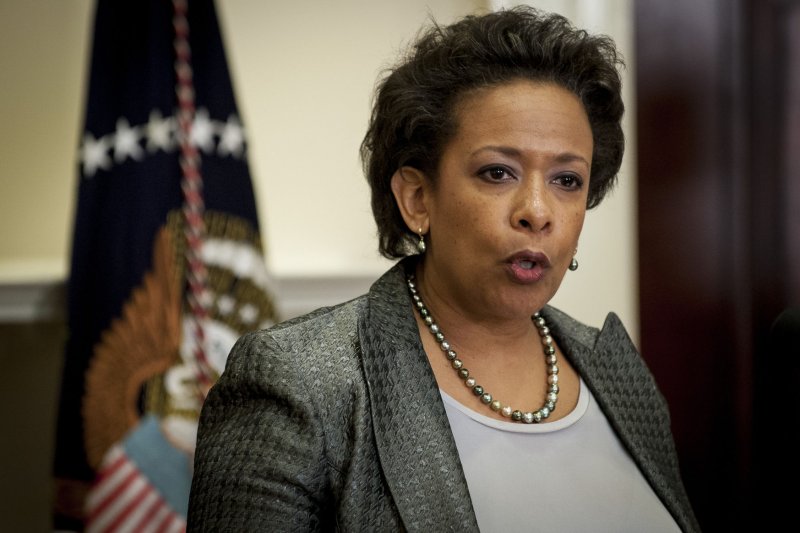U.S. Attorney General Loretta Lynch said traders in the foreign-exchange market colluded to manipulate the market for profit. Wednesday, five banks pleaded guilty to criminal charges and agreed to pay more than $5 billion in collective penalties. Pool Photo by Pete Marovich/UPI |
License Photo
WASHINGTON, May 20 (UPI) -- Five global banks pleaded guilty to felony charges related to manipulating foreign currencies and interest rates in their favor and have agreed to pay more than $2.7 billion in collective penalties, the Justice Department announced Wednesday.
Four banks -- Citicorp, JPMorgan Chase, Barclays and the Royal Bank of Scotland -- admitted to violations that included rigging foreign exchange prices for U.S. dollars and euros dating back to December 2007. UBS was also involved in the scam, but received conditional immunity from federal charges because it reported the misconduct.
U.S. Attorney General Loretta Lynch said the settlement ends the "breathtaking flagrancy," in which traders from competing banks conspired to rig the $5.3 trillion-a-day foreign-exchange currency market to maximize their profits. The $2.5 billion in criminal fines levied represent the largest anti-trust penalties ever obtained by U.S. authorities, Lynch said.
"The penalty all these banks will now pay is fitting considering the long-running and egregious nature of their anticompetitive conduct. It is commensurate with the pervasive harm done. And it should deter competitors in the future from chasing profits without regard to fairness, to the law or to the public welfare," she said. She did not comment about charges against individual bank employees, saying it is an ongoing investigation.
U.S. authorities said currency traders formed an invitation-only group they called "The Cartel," using chatrooms to manipulate the exchange rate between euros and dollars using coded language to their benefit. In one of the chatroom conversations, a Barclays trader, desperate to join The Cartel, was given a one-month trial and warned, "mess this up and sleep with one eye open at night."
"By agreeing not to buy or sell at certain times the traders protected each other's trading positions by withholding supply of or demand for currency and suppressing competition in the FX market," the Department of Justice said.
Each bank agreed to pay a criminal fine proportional to its involvement, the DOJ said.
-- Citicorp, which was involved from as early as December 2007 until at least January 2013, agreed to pay $925 million.
-- Barclays, involved from as early as December 2007 until July 2011, and then from December 2011 until August 2012, has agreed to pay a fine of $650 million. Barclays has also agreed to pay an additional $60 million criminal penalty based on its violation of the non-prosecution agreement in the June 2012 London interbank offered rate, or Libor, scandal.
-- JPMorgan, involved from at least as early as July 2010 until January 2013, agreed to pay a fine of $550 million.
-- RBS, involved from at least as early as December 2007 until at least April 2010, agreed to pay a fine of $395 million.
-- UBS agreed to plead guilty to manipulating the Libor and other benchmark interest rates and pay a $203 million criminal penalty, after breaching its December 2012 non-prosecution agreement in the scandal.
The global foreign exchange market, FX, is massive yet mostly unregulated. The penalties and pleas represent a first for parent banking companies, which are usually left off the hook in scandals and investigations. It's also a victory for the DOJ, widely criticized for being too lenient with big banks.
The felony charges mark the latest in a global crackdown on manipulation of financial benchmarks, including the 2012 Libor scandal that saw banks rigging rates for profit.















